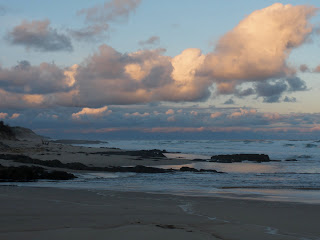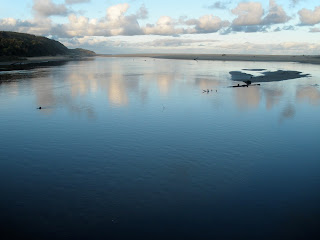 |
| Point Hicks Lighthouse |
The lightkeeper points – “Tassie is that way, and Antarctica. We get seven metre swells on the rocks there. The weather station is broken ‘cos the winds blew it apart.” Long straggly ponytail snakes from under his regulation cap. He continues “The light used to float in a mercury bath; it sent many lightkeepers insane, but it saved lots of lives too. If the mariners could see the reddened windows they knew it was time to hightail it out of there or they’d hit the rocks and go under. There were always two people up there from 4:30pm to 8am to keep the light burning. Even though they were so isolated, the light keeper's children weren’t allowed to mix with the children of the assistants. They could go six months without supplies if the weather was bad. Tough life”.
 |
| View from the top, looking north. |
Tough life indeed, and this region is remote even today. The roads are rough and narrow, but the remoteness adds to its attraction for those who are prepared to camp with few mod-cons. Actually, that should probably read no mod-cons as there are two long drop toilets and that's really it. BYO water, or get it from the creek. No power. No phone reception. It's peaceful!
These days the solar light is mainly used by local fishermen and small boat operators as the main shipping lanes have been moved further out to sea to keep away from the oil and gas fields. But things still occasionally go wrong and the lightkeeper may need to hang perilously from the walkway in a howling gale to correct a problem. But it’s rare problem now, thankfully.

Captain Cook was the first European known to have named Point Hicks. He named it after Lieutenant Hicks who sighted it first from the Endeavour in 1770 when they were heading to Tahiti to observe the transit of Venus across the face of the sun. The area, rich in sea life and animals had been home to a number of Aboriginal tribes for thousands of years, but as has been so often the case, this fact was overlooked on European settlement.
Before the lighthouse was erected in 1888, many ships foundered battling the wild seas and difficult weather. Even when the lighthouse was complete, vessels foundered within range of its light. Heavy seas, fog, sea mist, maybe poor seamanship or unseaworthy vessels were the possible causes.
The area on which the light-station is built is described as being a bleak, desolate and windswept point. It’s an accurate description. Everything had to be carried by ship, and landed during lulls in the weather. Livestock including goats, sheep goats and cows were kept to supplement the irregular supplies.
The cast-iron internal staircase was cast in Melbourne and the lantern house was built in England. I find it amazing that there was no one skilled enough to make the lantern house in Australia. It would have taken months to transport it.
 |
| Looking up the staircase - showing the underside of the staircase |
It is a beautiful structure and it’s possible nowadays to book and stay at the assistant's cottages if you want a holiday with a difference.
According to Robert Haldane in 'A Beacon on the Wilderness Coast:
The Story of Point Hicks (Cape Everard)' (
link), during the First World War mines were laid by a German raider along the Melbourne-Sydney shipping lanes and at least one ship struck a mine. During the Second World War a freighter along the coastline was torpedoed and sunk by a Japanese submarine, 38 lives were lost. This sort of information was censored heavily during the wars, and even today is greeted with amazement. It's as if the government wanted to eradicate these records entirely and for eternity.
 |
| Looking down from the top (camera held at arm's length) |
The lighthouse tower is open to visitors, and the view is breathtaking, but there have apparently been complaints from some prudish visitors about the obelisk and cairn marking Cook’s voyage and commemorating those who lost their lives in the various shipping incidents. They consider the shape too phallic. Tut tut.
In hindsight, the thing that brought me most happiness that day wasn't the wonderful views, the great conversation, or the interesting people I met, but traipsing around behind the tour-guide, cum ranger, cum caretaker, light-keeper and jack of all trades, observing the taking of meteorological readings and watching them being posted to the Bureau of Meteorology. Where would we be without them or the data they contribute?
 |
| Taking meteorological readings at Point Hicks. |
.
















